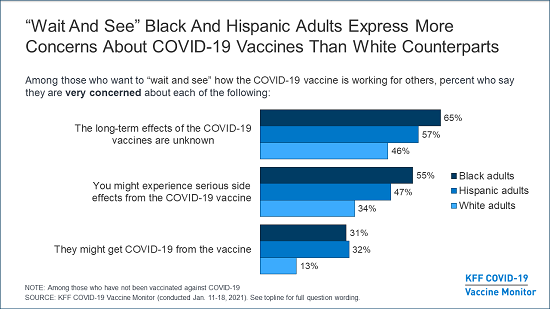
The independent source for health policy research, polling, and news.
Reasons Vary Why People Want to “Wait and See” Before Getting a COVID-19 Vaccine.
Nearly a third (31%) of the public says they want to “wait and see” how a COVID-19 vaccine works for others before they would get it, representing a critical group for efforts aimed at boosting vaccinations.
The latest analysis from the KFF COVID-19 Vaccine Monitor highlights how attitudes differ by partisan identification and race and ethnicity in ways that could affect what vaccination messages are most persuasive to subgroups. For example:
- Republicans and Republican-leaning independents in the “wait and see” group are more likely to believe that the threat posed by COVID-19 is exaggerated and that vaccination is a personal choice. Messages that focus on how getting vaccinated can protect people’s own health and the health of their families may resonate more with Republican audiences than those that emphasize the seriousness of the pandemic or the broader societal benefits.
- Black and Hispanic adults who want to “wait and see” are more likely than White adults to worry that someone in their family will get sick from COVID-19 and to express concern about serious side effects. About 3 in 10 also say they are “very concerned” that they could get COVID-19 from a vaccine, suggesting an opportunity to correct misperceptions about how the vaccine works among this group.
Available through the Monitor’s online dashboard, the new analysis also examines how different subgroups in the “wait and see” group respond to messages and information about vaccination and which sources of vaccine information they most trust.
The KFF COVID-19 Vaccine Monitor is an ongoing research project tracking the public’s attitudes and experiences with COVID-19 vaccinations. Using a combination of surveys and qualitative research, this project tracks the dynamic nature of public opinion as vaccine development and distribution unfolds, including vaccine confidence and hesitancy, trusted messengers and messages, as well as the public’s experiences with vaccination.
